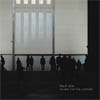 On his sixth solo album for Touch, Jeck continues his perfection of using the record player as an instrument (not as a DJ) to create a long-form piece that has no sense of gimmick or cliché, but instead is a hazy, but warm and inviting piece of captivating music that is unlike the work of anyone else. Originally intended for live performance, this studio reconstruction is amazing on its own.
On his sixth solo album for Touch, Jeck continues his perfection of using the record player as an instrument (not as a DJ) to create a long-form piece that has no sense of gimmick or cliché, but instead is a hazy, but warm and inviting piece of captivating music that is unlike the work of anyone else. Originally intended for live performance, this studio reconstruction is amazing on its own.
Having never seen performances nor read intimate details of his compositional technique, I’m fascinated by exactly how Jeck coaxes the sounds he does out of his rudimentary instrumentation.On this album, the requisite record players were used, along with the infamous Casio SK1 keyboard, mini-disc recorders, and a bass guitar with only a few effects.How this becomes the gauzy atmospheric music that is presented here, I don’t know, and I think I’ll be happy not knowing as long as the music keeps coming.
A recurring motif throughout the seven "main" songs here is a lo-fi melodic undercurrent that is absolutely immersed in reverb, giving a feeling that’s not unlike the Cocteau Twins or My Bloody Valentine but without sounding like either one of them.In these massive and heavy, but warm waves of sound, occasionally a bit of music is allowed to pass through.Percussion is hinted at on "Pilot/Dark Blue Night" but never fully appears until the closing "The Pilot (Among Our Shoals)" where it takes the form of snappy snare drum loops, with what resembles time-stretched harp plucks and violin notes as accompaniment.
As aforementioned, sometimes the musical source material shines through to the surface, such as on "Twentyninth," where the big reverberated sounds and cascading guitar tones could be a careful study and dissection of 1980s hair metal, reduced to its most base elements and rebuilt into something entirely different and far more compelling."Thirtieth/Pilot Reprise" continues this, focusing on hidden melodies and Jeck's overdriven bass guitar playing with a guitar-like squall and a thin, brittle closing section.
Other pieces are less discernable, such as the dramatic swells of indecipherable sound of "Dark Rehearsal," which are preceded by some subtle, delicate melodies."Pilot Reprise/The All of Water" is a chaotic pastiche of layered sound, immediately surging heavily and then continuing on with the same intensity, the sharp waves of sound battle one another over the dramatically drifting undercurrent.
For the album's coda, two remixes of tracks from Suite:Live in Liverpool are included, sounding noticeably different than the preceding album, but just as strong on their own.Mostly eschewing the hazy ambience of the other tracks, "All That's Allowed (Remix)" shapes shimmering passages of crystal sound into swirling melodies, keeping a very clean, sharp feel over a dynamic undercurrent."Chime, Chime (Re-Rung)" focuses on beautifully tactile static bursts covering a bell ringing alongside twinkling wind chimes with the occasional bit of squealing feedback. There is a different sort of audio grime that appears, and the whole song is more loop/sample focused than the other ones, which felt like they had more of an organic drift to them.
Philip Jeck's work continues to sound like no one else's, in the best possible way.Regardless of the instruments used, he constructs beautiful, tactile sound that spreads out and engulfs its surroundings, demanding full attention.Few albums I have heard this year are as immersive and captivating as this one.
samples:
 
Read More


